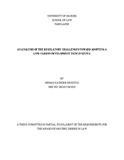| dc.description.abstract | It is universally accepted that climate change is one of the greatest challenges facing humanity
this century. The reality that human activity is changing the earth’s climate is now accepted by
almost all. Rapid economic growth has been accompanied by significant increase in energy
demand. Continual rapid increase in energy demand and consumption, and a large share of the
energy consumption being in the form of fossil fuel has led to an increase in Green House Gas
(GHG) emissions. Atmospheric levels of carbon dioxide (CO2) have increased steadily since
the beginning of the industrial revolution and these levels are projected to increase even more
rapidly as the global economy grows.
Evidence shows that ignoring climate change will eventually damage economic growth. Our
actions over the coming few decades could create risks of major disruption to economic and
social activity on a scale similar to those associated with the great wars and the economic
depression of the first half of the 20th century. Tackling climate change is the pro-growth strategy for the longer term, and it can be done in a way that does not cap the aspirations for growth of poor countries.
Notwithstanding the above, to many developing countries, climate change and carbon emission
reduction policy goals are not a major priority area since other development goals such as poverty alleviation energy provision are more important immediate concerns. Policy makers in developing countries often perceive a trade-off between economic growth and environmental sustainability. However there is growing evidence to show that environmental conservation for sustainability of natural resources is not a luxury but a necessity when considering long-term economic growth and development. Infrastructure and society changes that might be required to suitably and economically limit the consequences of climate change will require long implementations times. Therefore early identification of likely climate change effects and the potential responses to minimize the impact is essential. These measures include technological, institutional, financial and regulatory responses. | en_US |

